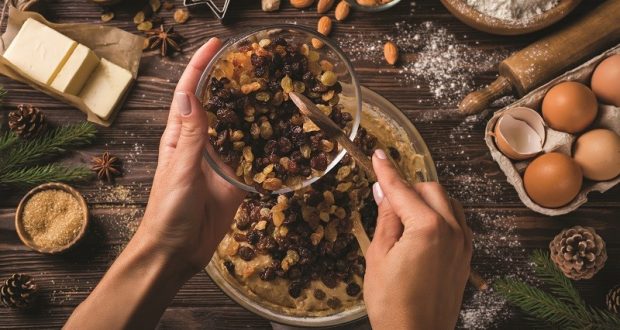With holiday menus in full swing, many Americans aim to add healthier dishes and ingredients to their seasonal tables but are hesitant to compromise on tried-and-true favorites.
Raisins fit seamlessly into many family-friendly recipes, like traditional oatmeal cookies, stuffing, casseroles and sweet breads. They also make for easy salad, oatmeal and yogurt toppers, provide a naturally sweet fruit option on charcuterie boards and act as a great standalone holiday snack. Raisins are free of added sugars and contribute micronutrients to your diet, such as iron, potassium, and fiber.
Many health-conscious consumers are interested in wholesome foods and products with less ingredients and natural sugars, like those that occur naturally in fruits, vegetables, grains and dairy products. Added sugars, however, refer to any sugars or caloric sweeteners that are added to foods during processing or preparation. The consumption of excessive added sugars may be associated with health consequences, such as obesity, cardiovascular disease, type 2 diabetes, insulin resistance, fatty liver, dental caries and more, according to research published by the National Library of Medicine.
The 2020-2025 U.S. Dietary Guidelines for Americans recommends that added sugars comprise no more than 10% of the overall diet for adults and children ages 2 and older.
“Aiming to consume regular, balanced meals throughout the day with adequate fiber is especially important around the holidays,” said registered dietitian Sarah Schlichter. “This helps keep blood sugar and energy levels balanced and consistent. We know limiting sugars in our diets can be beneficial to health and we can do this by choosing foods that offer less added sugars throughout the day.”
Swapping dried cranberries, which contain 27 grams of added sugars per 1/4-cup serving, for nutrient-dense raisins, which contain 0 grams of added sugars per 1/4-cup serving, is an easy substitution that can reduce overall sugar intake without compromising flavor or texture.
Understanding Natural Sugars vs. Added Sugars
Nutrition labels haven’t always distinguished between natural and added sugars, Schlichter said, but instead lumped them together under “total sugars.” However, the updated Food and Drug Administration’s Nutrition Facts label, which is in the transition stage, makes this easily discernible by clearly outlining how much of the total sugar content comes from added sugars.
“One key difference between natural and added sugars is natural sugars usually complement other nutrients organically found in a food or fruit, such as fiber, potassium, iron, vitamin C, or antioxidants, all of which confer several health benefits,” Schlichter said. “These complementary nutrients may also slow the rate of digestion, keeping blood sugar more stable. Conversely, added sugars are added during processing and aren’t adding any nutrients to the product.”
To put this in perspective, 1/4 cup of dried sweetened cranberries contains 29 grams of sugar. Of those 29 grams of sugar, 27 grams are added sugars, meaning that most of the sugar is not found naturally in dried cranberries. While a 1/4-cup serving of raisins also contains 29 grams of sugar, the difference is that all 29 grams are naturally found in raisins and none are added. Raisins also naturally offer potassium, iron, and fiber.
Making the Case for Raisins
To reduce added and total sugars, many products are formulated using artificial sweeteners, such as sucralose, aspartame, or other no-calorie sweeteners. No-calorie sweeteners are not free from health risks, however, and have been linked to weight gain, obesity, changes to the microbiome, decreased satiety and altered blood sugar levels, according to research published by the National Library of Medicine.
Additionally, 50% less sugar dried cranberries also contain unnecessary ingredients such as soluble corn fiber, table sugar, glycerin, and sucralose.
These products are not any healthier, Schlichter said, noting there is still much unknown about artificial sweeteners and how they impact hormones, satiety, and gut health. Because raisins have no added sugars, no artificial flavors and no unnecessary ingredients, Schlichter recommends utilizing them as an alternative this holiday season.





